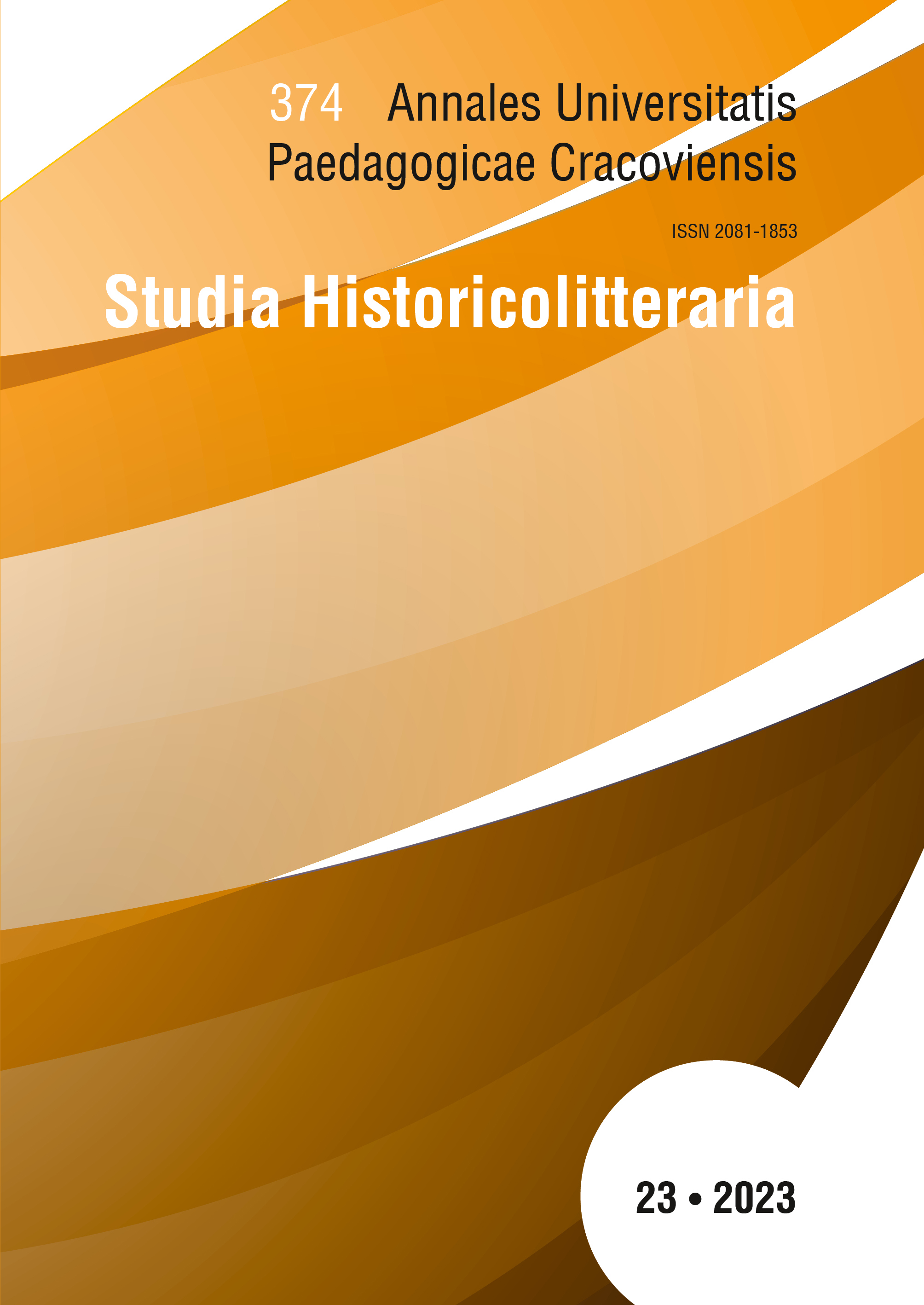The images of Polish rulers and nobility in Roman Iwanyczuk’s historical prose
Main Article Content
Abstract
The topic of the article is the image of Polish kings and nobility in Roman Iwanyczuk’s historical prose. The analysis was conducted on the basis of three works written at the turn of the 1970s and 1980s. They are only a fragment of the rich literary heritage ofthe famous Ukrainian novelist. Ciemnoczerwone wino (Черлене вино) takes the reader to the 15th century, to Galicia‑Volhynia, which was threatened with polonization. Manuskrypt z ulicy Ruskiej (Манускрипт з вулиці Руської) shows the origin of the idea of the liberation war, the future Chmielnicki Uprising, in Lviv at the turn of the 16th and 18th century. The novel Woda z kamienia (Вода з каменю) presents the beginnings of the Ukrainian national revival in Galicia and the history of the Ruthenian Trinity, with its leader Markian Szaszkewicz. The cyclicality and connections between novels, gives Iwanyczuk’s work spatiotemporal continuity, which encompasses, above all, historical events and figures. The analyzed works present a clearly negative image of the representatives of Polish society, which results from the stereotypical approach to the perception of a Pole in the 20th century Ukrainian literature. Polish rulers and nobility are portrayed through the prism of Polish‑Ukrainian relations at socio‑political, religious and ideological level.
Downloads
Article Details

This work is licensed under a Creative Commons Attribution-NonCommercial-NoDerivatives 4.0 International License.
COPYRIGHT POLICY
The publisher of "Annales Universitatis Paedagogicae Cracoviensis.Studia Historicolitteraria" is authorised to use and distribute all the materials published in the journal on the basis of a non-exclusive licence agreement unlimited in time – previously concluded for an indefinite period of time each time with the author of a specific paper in the fields of exploitation specified in the agreement.
OPEN ACCESS POLICY
"Annales Universitatis Paedagogicae Cracoviensis.Studia Historicolitteraria” is an open access journal, and all its contents are available for free to users and/or their institutions on the basis of non-exclusive licenses under Creative Commons (CC BY CC-BY-4.0). Users can read, download, make copies, distribute, print, search, or to link to full text articles in this journal without the prior permission of the publisher or the author.This is consistent with the definition of open access BOAI (http://www.soros.org/openaccess).
References
Andrusiv S., Piznaty svii narod, a v narodi sebe (U sviti istorychnykh tvoriv Romana Ivanychuka), „Ukrainske literaturoznavstvo”, vyp. 53, s. 141–149.
Andrusiv S., Umity rozmovliaty z chytachem. Rozdumy nad tvoramy Romana Ivanychuka, „Kyiv” 1987, № 5, s. 126–128.
Bartoszyński K., Zagadnienia komunikacji literackiej w utworach narracyjnych, [w:] Problemy socjologii literatury, red. I. Sławiński, Wrocław–Warszawa–Kraków–Gdańsk 1971, s. 127–148.
Bichuia N., Rozimknute kolo slova abo zh sviato vyznannia. Kilka rozdumiv pro novi tvory Romanna Ivanychuka, „Dzvin” 1995, № 5, s. 125–130.
Brojjtman C., Poehtika sjuzheta, [v:] Istoricheskaja poehtika, Moskva 2001.
Choma‑Suwała A., Roman Iwanyczuk – twórca powieści historycznej, „Studia Polsko‑Ukraińskie” 2017, t. IV, s. 169–184.
Donchyk V., Perekonannia romanista („Chetvertyi vymir” R. Ivanychuka), „Literaturna Ukraina” 1985, s. 6.
Fedorak N., „Vichni” obrazy v interpretatsii Romana Ivanychuka, „Ukraina: kulturna spadshchyna, natsionalna svidomist, derzhavnist” 2012, № 21, s. 782–786.
Hundorova T., Sotsrealizm yak masova kultura, „Suchasnist” 2004, № 6, s. 52–66.
Ivanychuk I., Cherlene vyno, Lviv 1979.
Ivanychuk R., Manuskrypt z vulytsi Ruskoi, Kyiv 1987.
Ivanychuk R., Voda z kameniu, Lviv 1982.
Kępiński A., Lach i Moskal. Z dziejów stereotypu, Warszawa 1990.
Kozak S., Polska a Ukraina. Drogi i bezdroża porozumienia, „Więź” 1991, nr 11–12, s. 112–121.
Lomazova K., Svit romantychnyi i bezzhalnyi (Retsenziia na romany R. Ivanychuka „Cherlene vyno”, „Manuskrypt z vulytsi Ruskoi”), „Literaturna Ukraina” 1979, 21 serpnia, s. 2.
Mitosek Z., Literatura i stereotypy, Wrocław 1974.
Moroz L., Tryiednist yak osnova universalizmu (natsionalne – zahalnoliudske – dukhove), „Slovo i chas” 2002, №3, s. 22–32.
Slaboshpytskyi M., Ozvatysia holosom z istorii, „Vitchyzna” 1984, № 2, s. 196–199.
Wajda K., Polski obraz Niemców i niemiecki obraz Polaków w publicystyce obu krajów w latach 1871–1914, [w:] Polacy i Niemcy. Z badań nad kształtowaniem heterostereotypów etnicznych, red. K. Wajda, Toruń 1991, s. 45–86.
Walińska H., Stereotyp – pole terminologiczne, „Acta Universitatis Wratislaviensis. Prace Literackie XVI”, Wrocław 1974, s. 47–48.
Yavorivskyi V., Ne restavratsiia – osmyslennia (Retsenziia na roman R. Ivanychuka „Cherlene vyno”), „Literaturna Ukraina” 1978, 9 chervnia, s. 7.
